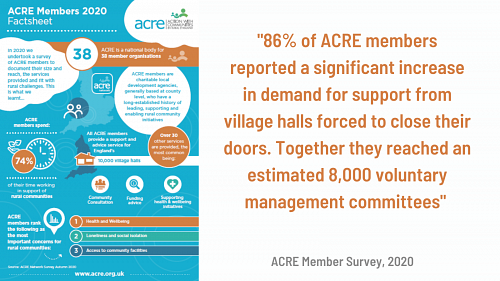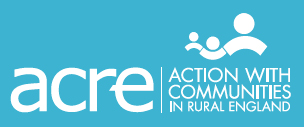Rural charities report significant increase in demand for support
Research conducted by Action with Communities in Rural England (ACRE) shows how its members were needed more than ever due to Covid-19 – putting pressure on their finances.
100 years of supporting rural community action could not have prepared the 38 county-based charities that make up the ACRE Network for the dramatic events that began this time last year.
In the space of a few weeks, staff began working from home, information and advice was hurriedly prepared and issued to groups, and services traditionally provided face to face were moved online. At the same time, there was an unprecedented increase in demand for support by groups wanting to know how to respond to lockdown restrictions and look after vulnerable residents.
In a survey conducted last year, 86% of ACRE members reported a significant increase in demand for support from village halls forced to close their doors. Together they reached an estimated 8,000 voluntary committees, helping them apply for emergency grant funding and make sense of rules on social distancing once activities could resume.

More than two-thirds of members also reported an increase in demand for volunteer support and initiatives relating to health and wellbeing – much of which can be attributed to the sudden surge of interest in good neighbour schemes and mutual aid groups which played a crucial role in making sure vulnerable residents received essential food and supplies during the first lockdown, whilst reducing isolation.
But this brings us to the Rumsfeldian Paradox. In our experience officials across Whitehall, throughout many government agencies and local authorities, do not grasp ‘rural proofing’. They do not see that the inconvenient and expensive needs of 17% of the population are important or distinct and, crucially, they don’t know, what they don’t know.
If you have no instinct for how life in rural areas works for the woman on the non-existent Little Clapham-in-the-Marsh omnibus, you cannot hope to spot when a piece of policy or service planning needs to be ‘rural-proofed’. If you cannot see the need, you will not even start, let alone know how, to carry it through. Even more importantly, if every pronouncement from Government suggests that the only important difference between urban and rural areas is that rural ones are beautiful natural places in need of re-wilding, you could be forgiven for thinking that the people who live there can be left as an afterthought. Are they not privileged enough, just to live in such a wonderful place?
So, how do we break the Rumsfeldian circle? How do we help officials and politicians to come to know what they currently do not know about the impact of their actions on rural people?
The concept of mainstreaming is clearly a laudable one, so is the publication of an annual Rural Proofing Report. But these alone will not catch the unintended consequences of policy that has only been thought through from an urban perspective. It will not prevent a consultation on access to broadband for the very hardest to reach places being carried out exclusively online ! Or every small hospital that serves rural populations ending up in ‘special measures ’ simply because a sparse population limits the resources available to them. Or transport policy being guided exclusively by ‘urban mobility principles’ lifted directly from an urban strategy and with limited relevance to rural areas.
The 2020 Rural Proofing Report does its best to find something optimistic to say. It tries, but ultimately it has little material with which to work. Little public policy has genuinely been rural-proofed over the last few years, and it is clear that rural people and communities are not at the heart of Government decision making. It is time for a different approach.
We need a small unit, close to the heart of Government, with a clear and powerful remit to examine policy as it is developed, and to find ways of bringing rural access to public services in from the cold. This is required if Government’s efforts to ‘rural proof’ and ‘mainstream’ all departments, agencies and local authorities are to be effective. We must ensure that rural people are not unreasonably disadvantaged by where they live.


